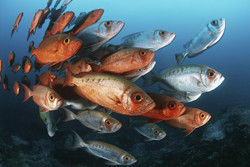Effect of species loss on marine ecosystems
The 'Fish community structure and ecosystem properties in a global change context' (FISHECO) project analysed the relationship between community structure and the function of coastal ecosystems. Rather than viewing fish as a food resource, the initiative examined the role of fish in coastal ecosystems, within the context of global change. FISHECO investigated if all the species found on coral reefs or coastal ecosystems are needed for the system to function, or whether the ecosystem can cope with species loss. Results indicated that even in species-rich tropical systems, such as coral reefs, the erosion of species diversity cannot be discounted. This is because species tend to be concentrated disproportionally around a few activities, rather than being spread evenly, with many functions being performed by a single species. In addition, it was shown that rare species go extinct more rapidly when faced by pollution, habitat degradation and fishing activity. Ecosystem function is therefore fragile, remaining susceptible to biodiversity loss, including rare species. FISHECO's second objective was to assess the severity and type of disturbances caused to ecosystems as a result of human activity. This is traditionally determined by measuring the decline in populations or the loss of vulnerable habitats and species. However, ecosystems do not need to suffer species loss in order to react to disturbance from human activities. For example, the loss of some traits from the ecosystem, such as fish with large body size when under pressure from fishing. Therefore, FISHECO investigated the effect of human activity on the taxonomic and functional diversity of fish communities across the Pacific. Results indicated that caution should be used when using species richness to measure the condition of ecosystems. This is because they are less responsive to changes in human population density than when using species function as a barometer. Dramatically reduced by human activity. loss of functional diversity may threaten the performance of ecosystems. The FISHECO project highlighted the role of rare or threatened species and the unique and irreplaceable functions they perform in coastal and coral reef ecosystems. As such, project results can play a valuable role in guiding future conservation strategies and new experiments for determining the role of rare species in ecosystems and for conserving biodiversity.



